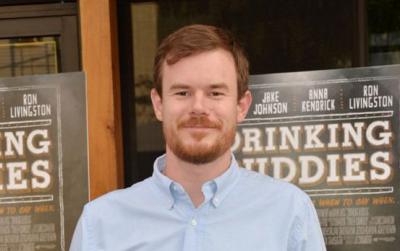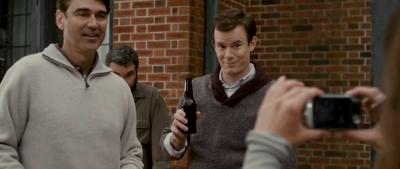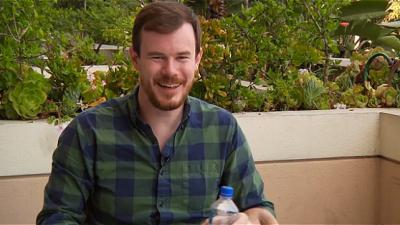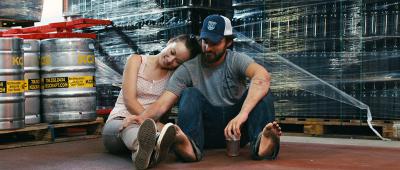By: debbie lynn elias
I admit it. I am in Joe Swanberg heaven right now. He acts, he writes, he directs, he produces. He delivers quirky, strange, even weird, fun and then on the turn of a dime, hits you hard with theme and messaging that makes you think. And right now, we’ve got two chances to look at two different sides of Joe Swanberg on the big screen. With his wonderful performance in YOU’RE NEXT, Adam Wingard’s latest film that turns horror on its head, and then his own DRINKING BUDDIES marking Swanberg as a more mature and defined writer/director, Joe Swanberg has become a hot property. Stepping out of the micro-budget world of indies like LOL, Silver Bullets and V/H/S, into the micro-brewery world of craft beers and microscopic world of relationships with DRINKING BUDDIES, Swanberg is thoughtful, reflective and appreciative of the life he now has and the growth he is experiencing as a man and a filmmaker.
I sat down with Joe for this exclusive 1:1 interview talking YOU’RE NEXT, DRINKING BUDDIES, growing up and filmmaking buddies.

I saw YOU’RE NEXT which is one the coolest fucking movies I’ve ever seen! I saw your name, Ti West, Larry [Fessenden] and Adam [Wingard] and that’s all I needed to even want to see the film. Then I saw your performance – you’re unlikeable, then you’re cocky and you’re arrogant and you fall and stumble and bleed so well. And then the false bravado and martyrdom of pulling an arrow out of your back. . .You’re the guy that you just want to slap upside the head and say, “Buck up, Man!”
I know, I know. Believe me. I’m very proud and excited to have anything to do with that. [laughing] It’s a great role to play. When they sent me the script I was immediately very excited. Isn’t it wild that this little community is in this movie that so many people are gonna see? It’s shocking to me. It’s really weird to think about that so many of us have worked together for so long on these little projects and now suddenly, it’s like you’re driving around and there’s billboards everywhere. I don’t think 99% of the people going to this movie are going to realize how bizarre it is that all of these people are together.
It’s this great magic among all of you and it’s something I was going to ask you later but we might as well hit on that now. What is the magic of this little group of you and Ti and Larry and Adam and Simon [Barrett] and the rest of you?
Ti and I premiered our first movies together at SXSW in 2005. We both went back there this year and realized it was the 9th year in a row we had been to SXSW. There’s something about connecting artistically with people early in your career where nobody has anything to gain from it that I think forges true friendships and true artistic collaborations. Larry was the only guy that sort of already had a career at that point and he’s the coolest. There’s zero ego involved with him. I think for the rest of us, we got to experiment together when we were young. We got to make weird projects, we got to try different things. Now that people are starting to have some success and the movies are getting seen by more people, there’s still such a strong bond. I think that’s what it is. It was formed early enough that we all really trust each other. So we’re ready to go there for each other.
Interesting is that you each have different sensibilities when it comes to filmmaking with your styles and the depth and content and texture that you each bring. Each is separate and distinct but then when you do come together, nothing over-rides the other and you get this perfect symbiotic relationship with all of you.
Yea. It’s true. I think it speaks also to the shared struggles of all independent filmmakers. Whether you’re making a horror movie, a romantic comedy, a drama, a musical, whatever – if you’re working with limited means and limited resources, we all had to be clever in the same ways. We all had to make use of the tools in the same ways. So I think when you cross-pollinate genres then, at least for me, I discovered there’s way more overlap than I suspected in the way Ti would make a movie and I would make a movie, even though the finished products are so different. We have to have the same attitude on set everyday.

Well, talking about attitude on set and going outside the box, you really stepped out of your comfort zone with DRINKING BUDDIES. My initial thoughts on screening the film were “like a well crafted craft beer that celebrates the touch of a micro-brewer, DRINKING BUDDIES is one tasty treat that lingers like a welcome beer buzz afterglow.”
I’m very happy to hear that.
It’s a wonderful thoughtful film. It is so textured and, pardon the beer pun, but it’s very full-bodied with your characters and your story. Considering, from what I understand, most of the dialogue is improv-ed but you did actually structure out your plot points.
Quite a bit more than every before. I discovered I had to. Going into it I was nervous that I was basically taking this very small delicate process that I had been working with and I was about to subject it to a “movie shoot”. I was nervous that things would be lost in translation and that I would find myself in the middle of a production that didn’t have the intimacy or the spontaneity of the whole reason why I work this way. The producers and I had long conversations leading up to the shoot about which aspects were the most important to me. It always came back to performance; it came back to no matter how many people were working on the movie, once the camera is rolling I wanted it to feel like a small shoot, I wanted to lose as much of the infrastructure while the camera is rolling as possible. I discovered a few days in what a pleasure it was to have all of these helping hands around and rather than get in the way of the thing that I was excited to do, I could use all of these people to nurture the process basically. Additionally, the things that happened in my other films by default through lack of resources or lack of time or whatever else, didn’t have to be issues here. Historically, if I was shooting a movie and we needed characters’ apartments, I just had to find friends who were willing to turn over their place to me for a couple of days. But I didn’t have an art department that could dress it, that could make specific choices based on the characters that are living there. I had to pick a place that roughly resembled where this person would live and then make do with what was there when we get there.
And just say, at least, please don’t have dirty dishes in the sink.
Exactly! It was such a thrill to be a filmmaker with DRINKING BUDDIES and say, with Ron Livingston’s character, I want this guy to have a big record collection, I want him to have a really nice stereo, I want him to have a nice liquor cabinet – and he doesn’t drink beer. He’s got a lot of fancy whiskey. To be able to make character choices and then have the money and the resources to show up on set and have it look great and have a great production designer who has his own vision and has added 15 other things I didn’t think about. It was an incredible experience to do the movie. It was amazing to be working at that level.
The production design is one of the things that I think is just stunning with your contrast and so much going to each of your characters’ sensibilities. You mentioned Ron Livingston’s apartment. I am so in love with the brick walls and the record collection. Stunning!
Absolutely!
And you capture different age demographics with your design but at the core you come back to the cleanliness and pristine beauty of the brewery. And kudos to you and cinematographer Ben Richardson.
He is amazing.
Ben is very dear to me. To see this after Beasts of the Southern Wild, it really gives him the opportunity to frame in a controlled setting. He has some very metaphoric visuals, a sleekness, that you use to wonderful ability with the storytelling.
He’s great. I actually hadn’t seen Beasts when I hired him to shoot DRINKING BUDDIES. It was through a conversation [that he came onboard]. We just talked for an hour and there was a mind meld experience where I just knew that we would work together well, get along well, and that also, we were philosophically coming from the same place in terms of what kind of production we wanted to have. He’s a performance oriented DP which is amazing. For me, it’s the best thing you could possibly be. He somehow manages to be completely technically literate in not only film but digital. He’s like an egghead who knows all the numbers and stats and is completely up to date with cameras and then manages to turn that off the second the camera’s rolling and he’s 100% an emotional presence. He’s feeling light and framing. It was so fun when we did Q&A’s at SXSW to hear the actors talk about Ben like he was another actor in the film; the way he moved the camera and the way his presence felt on set, that they could be aware of him and play with him in a way. It was fun to watch. It was amazing. Until he gets way to famous to shoot my movies, I will certainly ask him to shoot all of mine!
That’s the beauty of Ben because he is so grounded and such a decent, warm guy, he’ll never get too big and never tell you “no” unless he has a conflict.
I hope not!
Well, if he does, then you go to Jimmy Muro who is equally as impressive. With this new filmic structure of having more structure, particularly having more money for a “real budget”, what kind of challenges does that present to you? In the past you could just think on the fly but now you have structure in place that makes it a lot more difficult to deviate from a scenario arising from a flash of brilliance you might have in the middle of the night.
I’ll tell you – The biggest challenge is just the pressure I put on myself to make a movie that justified the increased scale. It’s nerve racking. Not in a bad way. Actually in a good way. It’s a nice kind of pressure. But as this movie came together – when I first started talking to Alicia [Van Couvering] about the story, I didn’t know how much it would cost. It wasn’t a movie where we were like, “we want to make a movie of this size.” It was that I want to set a movie in a brewery, I want to work with these characters. Then as the budget came together we just realized it was going to have to be quite a bit bigger than anything I had done before. There was a moment where it was “Oh shit.”

Only one “oh shit” moment? [laughing]
[laughing] That was the first “oh shit” moment. I’m gonna have to make this thing and I can’t just decide I want to put a camera on a tripod and shoot a 12 minute unbroken take of two people talking. It’s not gonna work. But, honestly, the experience of being on the set of YOU’RE NEXT and watching Adam [Wingard] who I met when he was flat broke, who was probably flat broke the day they started shooting YOU”RE NEXT, too [laughing] – this is a guy who slept on my couch for a month while we made three micro-budget movies in a row. He and I came from the world of nothing – to get to Columbia, Missouri and see this guy commanding a ship of a crew of 30 and tons of effects and two cameras and all this stuff. It was inspiring. I’m not often inspired by my close friends in that way. You have these heroes that are kind of unreachable. “Oh, it’d be great to make a movie like Robert Altman some day.” But your friends are just your friends and you’re like, “We all just do these things, but these are the gods.” It was amazing to get there and really see Adam step up to that level and work his ass off and then to come into the editing room and just focus and get that cut ready for Toronto. I just saw a guy who is prone to being a sort of stoner-slacker kind of dude, I saw him really like a laser, just hone in on this movie and he made a great movie. In a way [for me], it was no more excuses. It’s possible to go from a $5,000 production to a much bigger movie and it’s possible to make something great. Going into DRINKING BUDDIES, I thought of him every single day in terms of, “Wake up. Go do your job. Laziness is not an excuse. Indie street cred is not an excuse. There’s you and a good movie and you can’t let anything get in the way of those things.”
What made “now” the right time for you to do DRINKING BUDDIES? To step up your game and challenge yourself?
I had a kid which is a very cliche reason, and I’m not saying that financially. Emotionally, just the changes I went through in my life being responsible for another human being.
All of a sudden you’re a grown up.
Yea! There’s no denying that I’m a grown-up now. I can’t fool myself anymore. [laughing] And, I don’t know, I was ready. Coming out of Hannah Takes the Stairs, there was interest from agents and that was sort of the first thing that I had made that had gotten some attention. I was so punk rock about it at the time. I blew a lot of people off. I didn’t return phone calls and I was already midway through the next movie and I just felt like I have zero interest in that. “Those movies suck. I’m doing my thing here.” I think it was a process of growing up. I went hard in that other direction and I’m glad that I did. I made very weird movies. I explored a lot of topics that aren’t commercial that I’m glad that I made when I made them. But, I’m at a point right now where I don’t take for granted what it means to come out to a movie theater and plop down $15 and spend two hours watching somebody’s work. It’s a responsibility that I feel now in a way that I didn’t used to and I want to be an active participant in that transaction. It’s tough to say these things because I fear if I were to read somebody else saying these things it would sound like some kind of lowest common denominator statement. That’s not at all what I mean. I’m not dumbing the movies down now to make them more accessible and commercial. I guess what I mean is there are choices that I can make that are more difficult choices to make because now I have to do two things. If I’m making a $10,000 movie that I know is just gonna play arthouses, then that’s its own set of challenges and I can really be completely free and crazy to try whatever I want with the goal of trying to put something on screen that I feel artistically connected to. With something like DRINKING BUDDIES, it’s not the opposite of that. It’s not that now I just have to put whatever on screen is gonna make people happy. It’s actually doubly difficult because not only do I want to put something on screen that I’m artistically connected to, I also want to put something on screen that’s gonna entertain an audience for an hour and a half. It’s not less of a challenge. It’s twice the challenge.

Sure, because you’re not just doing it for yourself or your sensibility. You’re trying to satisfy yourself and everybody else without sacrificing your integrity.
Yes. That’s right. So, when I look at it that way, it seems noble as a challenge. Obviously I won’t successfully do it everytime. Even all my favorite filmmakers manage to fuck it up every once in a while, but that’s the point that I’ve reached. That’s why “now.” That’s why it was the time to do DRINKING BUDDIES. I’m ready to have a dialogue with the audience. I’m ready to have that be a two-way conversation and I’m ready to tell stories. I’m ready to entertain and I mean that in the most sacred tradition of the word entertain. . .I want to engage them.
The characters resonate but you take them beyond resonating. You have guys who go hang out in happy hour like 90% of the world does. But then you also show them at work. And you show how pristine and how careful they are, and the pride they have in themselves, in their work, in their job and in a job well done. It’s not just a stoner-slacker movie. These are responsible people like so many of your core audience is moving into their own responsible stage of life. It’s very very thoughtfully portrayed.
Thanks. It’s important. I’ve sort of always hoped that the movies would grow up with me and that they would just accurately represent wherever me and my friends were at, at whatever time we were making the movie. These marriage conversations and relationships are getting more serious. The stakes are higher. People’s careers are becoming more important to them.
You’re not just working at McDonald’s.
Yea and you’re not just freelancing, you’re not just whatever. The time has changed from “I’m just doing this now while I figure out what I want to do.” At this point, most people have figured out what they want to do and they’re trying to get good at it or trying to be successful at it. And well, you know, I’m going to a lot of weddings these days. The big hope is that [my movies] are universal topics as well. As the stakes get higher, these movies become less navel gazing or whatever the detractors said about them. They become less specific to just middle class white people, too. The issue of “do we take this relationship to the next step” becomes an issue that everybody deals with even though the characters in DRINKING BUDDIES are still middle class White people. The hope is as well that the audience expands just because the stakes get a little higher and the themes become a little more universal.
This is the first film where you have not worn every hat in the production. You gave up control of cinematography to Ben, you retained your editing control though which is important, especially for a film like this that is improv-ed. Only you know what your story structure is.
That was important. That was very important.

But how important is it to you as a director , be it now or even ten years from now, that you do have this eye and these capabilities for cinematography, editing, writing, etc. How much does that inform you when you do give up some of the reins?
It’s helpful. I suspect that even if I move into an area where I’m mostly being a director that I will still be making small movies with my friends where I am doing everything because want to stay in practice. It’s helpful. I think all directors ought to know what it’s like to hold a boom pole on somebody’s head. I think they ought to know what it’s like to be a cinematographer. They ought to know what it’s like to be an editor. It’s all useful. Just like what I was saying in answer to your last question, you do reach a point where you’re in your 30’s and if you want to be really good at something, you kind of have to focus on it. It’s how I feel about directing. It’s a very specific type of production which I can wear all of the hats effectively. On a movie like DRINKING BUDDIES, I would not have been effective if I had also tried to be the cinematographer and also tried to be something else. At least not yet. Guys like Soderbergh and some other people have managed to remain effective even at the very high production levels, but it took a while. It wasn’t right off the bat. I’m just at a point in my career where I’d rather be a great director than a great cinematographer, so I’m getting a little more serious about honing those director’s skills more than honing those cinematography skills. But I always want to be able to pick up the camera and make effective images. I’m just so happy that you liked DRINKING BUDDIES! It was the right time and many subjects I care deeply about, all gelling together.
#
8/13/13











